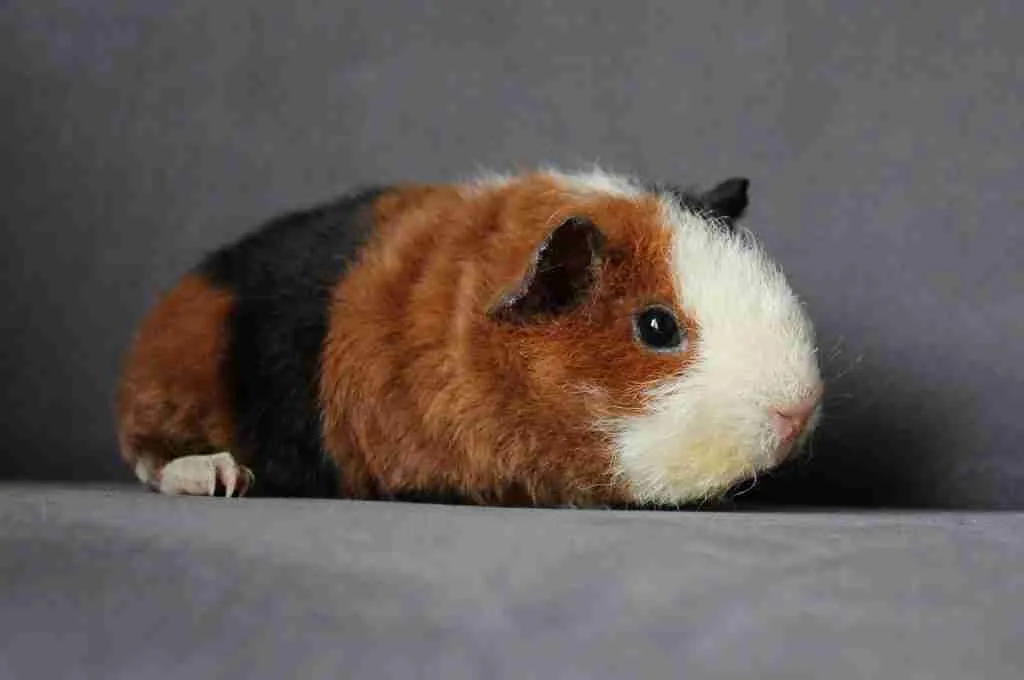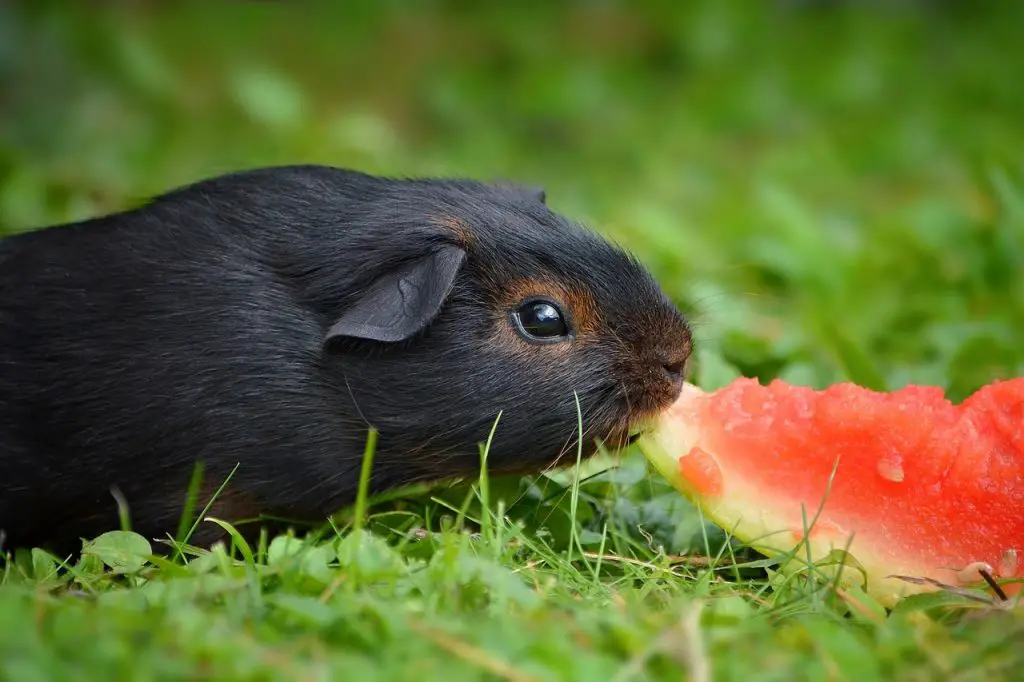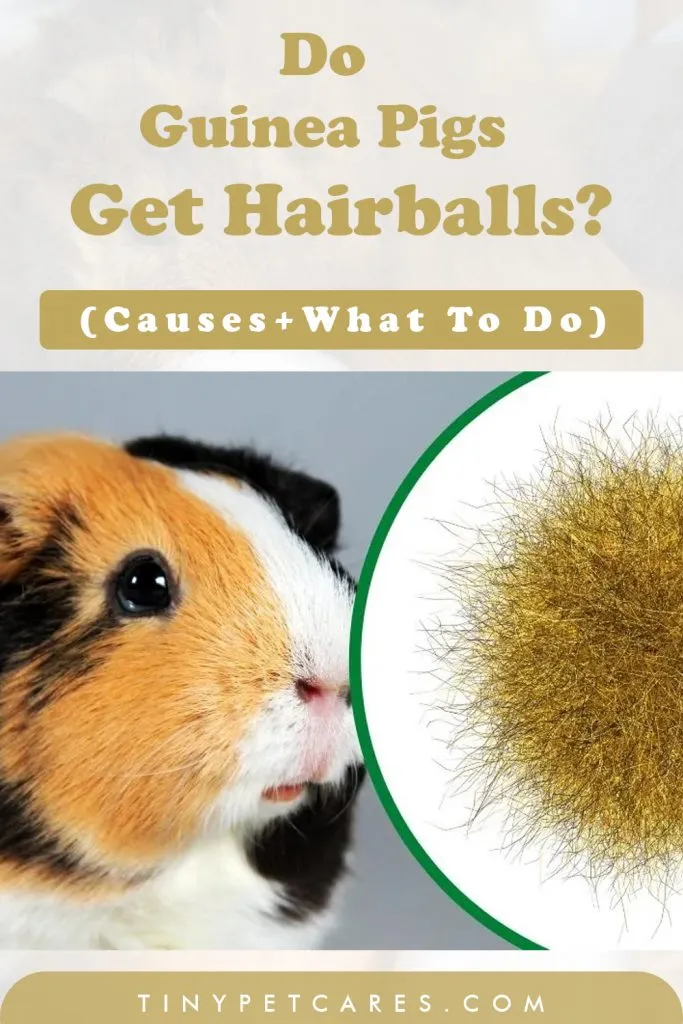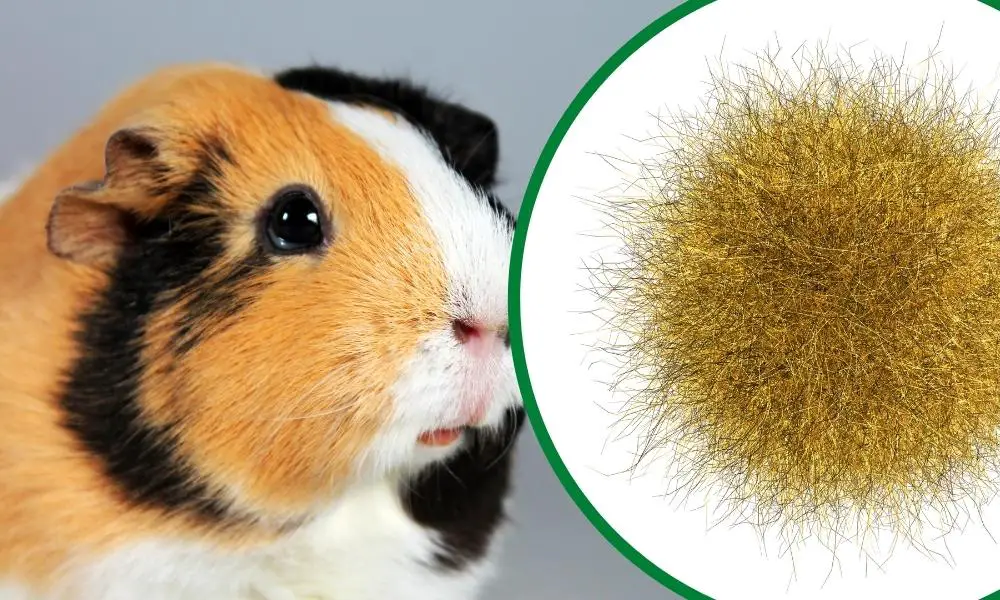Take a close look at some pet animals, like cats, and you’ll notice that they groom themselves.
But most of the time, these pets swallow their furs while grooming which can form clumps known as hairballs.
So do guinea pigs get hairballs too?
The answer is yes, guinea pigs can get hairballs even though it is rare. Moreover, it is normal for them to have little furs in their digestive system which they release through feces.
However, health problems happen when your cavies swallow too much hair or when the hair becomes too dry. As a result of this, they’ll begin to experience unpleasant symptoms.
This condition is commonly known as a trichobezoar.
Now that you are aware that guinea pigs can get hairballs, you may be wondering why they get it.
All you need to do is to keep reading to find out!
Table of Contents
Why Do Guinea Pigs Get Hairballs?
Everything being equal, healthy cavies should be able to pass out the hair as waste. But if your guinea pigs have hairballs in their stomach, then something is wrong.
That said, here are the 4 possible reasons your guinea pigs can get hairballs:
1. Low-Fiber Diets
Enough fiber in diets is known to enable easy digestion in guinea pigs. So even if your small pets swallow hair, they can pass it out as feces before it forms clumps.
But if they don’t eat fiber-rich diets or eat so little, they’ll likely have hairballs.
2. Little Water Intake
Clean water is also good for easy digestion. It helps the internal organs to work perfectly thereby allowing their normal functioning.
By giving your guinea pigs little water, you’re exposing them to the risk of wool blocks.
3. Excessive Grooming
Lack of activity gives guinea pigs free time to continually clean themselves. For example, if your cavies don’t have toys to play with or space to run around, they’ll be bored.
Boredom in guinea pigs leads to stress, which then causes excessive grooming.
4. Digestive Problems
Diseases such as gastrointestinal stasis and other digestive problems can cause a wool block in guinea pigs. It weakens the digestive system of guinea pigs thereby preventing them from releasing the swallowed furs with feces.
Also, it slows down the digestion process, which then causes fur to form balls in their stomach.
5. Inadequate Brushing
Constantly brushing your guinea pig’s body helps to remove fallen furs and other dirt. But when you don’t brush their body regularly, they tend to swallow hairs when self-cleaning.
In the long run, the hair may form balls in your cavies’ stomach.
Signs That Your Guinea Pigs Have Hairballs
Usually, guinea pigs are good at hiding their symptoms – it is one of their survival instincts in the wild.
But when your guinea pigs begin to show these 4 signs, contact your vet immediately.
1. Constipation
Hairballs, also known as wool blocks, can cause difficulty in defecation. Guinea pigs poop regularly, especially after eating hay, fruits, or vegetables.
But if your guinea pig doesn’t defecate like before or the feces is small, he may have hairballs.
Also, if you notice that your cavy is experiencing pain while defecating, then something is not right.
2. Sudden Quietness

Healthy guinea pigs love playing with themselves and running around their environment. If you notice that one of your pets is unusually quiet and withdrawn, he is likely sick.
You should understand each of your guinea pigs’ behavior so that you would notice anything strange.
3. Pain
Another symptom of hairballs in guinea pigs is pain. You may notice that the affected cavy is visibly uncomfortable and continuously grinding his teeth.
This means your cavy is going through serious pain and needs immediate help.
4. Loss of Appetite
Constipation causes stomach fullness and without defecation, there will be no desire for food. As a result of too much hair in your cavy’s stomach, he may begin to feel less hungry.
Without taking quick medical action, the affected pet may refuse to eat and this may lead to starvation.
What To Do If Your Guinea Pigs Get Hairballs
No matter how mild or severe your guinea pigs’ symptoms are, the first thing to do is to visit your vet. They’ll check the sick cavy’s stomach to be sure he has hairballs for sure.
Once it is confirmed, treatment will then start immediately.
Here are some treatment methods your vet may offer:
1. Enzyme Tablets
Wool balls are made up of proteins commonly known as keratin. Enzyme tablets help to break down these proteins, which then allows the hair to come out with feces.
However, ensure you seek your vet’s approval before giving your cavy this drug.
2. Stomach Massage
Massaging the stomach of the affected pet can also break the wool block down thereby providing relief. However, ensure it is done by a professional because this procedure requires extreme care.
Trying to massage your guinea pig’s abdomen by yourself can worsen his situation.
3. Fluids
Liquids mixtures can help to stimulate some organs in your guinea pig’s body. Therefore, your vet may give the cavy intravenous fluids for hydration to enable digestion.
They may also include fiber in the fluid as it improves the digestive system.
4. Surgery
After your vet has tried everything possible without seeing positive results, they’ll recommend surgery. It is always best not to allow your small pets’ condition to become severe because surgery is risky.
They may not survive the surgery and even if they do, your cavies may not recover well.
How to Prevent Your Cavy From Getting Hairballs
Taking your guinea pigs to the vet’s appointment can be time-consuming. Therefore, prevention is always better, cheaper, and safer than cure.
Here are 5 ways to prevent your guinea pigs from getting hairballs:
1. Provide Toys
Boredom is the main reason your guinea pigs groom themselves thereby swallowing hair in the process. Provide toys to keep them busy all day long.
Preferably, you can buy chewable toys for your cavies.
2. Give Them Fiber-Rich Diets

Vegetables, fruits, and even hay are great sources of fiber. Always make these diets available for your guinea pigs as it allows easy digestion.
And even if they swallow hair, their rich diets will not allow it to form wool blocks.
3. Regular Water Supply
Always provide enough clean water for your guinea pigs and ensure they drink it. Water improves the functioning of the body organs, including the digestive system.
Juicy fruits like pineapple, orange, and watermelon are good for cavies too but in small amounts.
4. Trim Or Brush Their Furs Constantly
Whether your guinea pigs are long-haired or short-haired, you need to trim and brush their furs regularly. This helps to keep your cavies’ hair short so that they won’t be able to swallow it while grooming.
Small, soft brushes are better for grooming your pets than hard ones.
5. Practice Cleanliness
Always ensure you clean your cavies’ bowls, plates, and cages. While grooming, furs may have fallen into their food bowls unknowingly.
If you don’t clean your guinea pigs’ environment, they may keep swallowing hair with food.
Therefore, create a regular schedule of when to clean your guinea pigs’ environment and feeding items weekly.
Related Questions:
Can Guinea Pigs Die From Hairballs?
Yes, guinea pigs can die from hairballs if you don’t take quick action. There is hope that the affected cavy’s situation can be treated with drugs like enzyme tablets.
Once the drug is taken, the wool block will reduce and the affected cavy will pass it out as waste.
However, if the condition becomes so serious that it requires surgery, your small pet may die. Being small animals, most guinea pigs cannot handle the infection and pain that comes with surgery.
Always keep a close watch on your cavies at all times so that you’ll know when they are not feeling well.
Do Guinea Pigs Cough Up Hairballs?
No, guinea pigs do not cough up hairballs, which means they can only pass it out with feces. With rich fiber in their diets, cavies can release furs as waste before it forms wool blocks.
But if they don’t eat healthily, hairballs may eventually get stuck in your cavies’ stomach. Problems like this can lead to infection and eventually cause the death of a guinea pig.
Final Thoughts
Now, we’ve come to the final part of this article. Keep a few key points in mind before you leave.
Guinea pigs can get hairballs if they keep swallowing their furs while grooming.
Low-fiber diets, excessive grooming, digestive problems, and little water intake can cause hairballs in cavies.
Symptoms of wool blocks in guinea pigs include constipation, pain, quietness, and loss of appetite.
Enzyme tablets, stomach massage, fluids, and surgery are the common treatments offered for this condition.
Finally, always provide toys, clean water, and fiber-rich diets for your pets to prevent hairballs.
Did you find this article helpful? Share with friends on social media!
Love It? Save It On Your Pinterest “Guinea Pig Board”!

